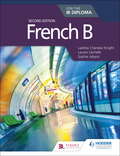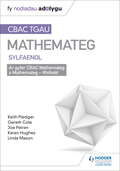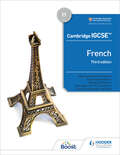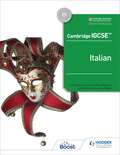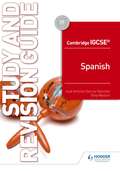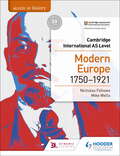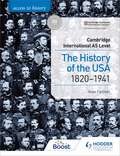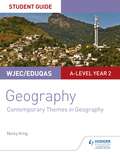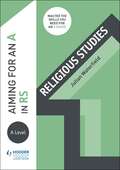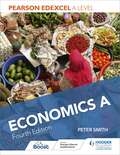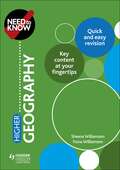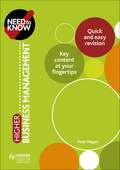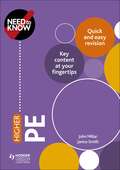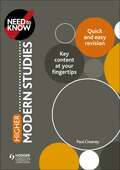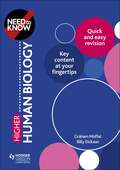- Table View
- List View
French B for the IB Diploma Second edition
by Lauren Léchelle Sophie Jobson Laetitia Chanéac-KnightExam board: International BaccalaureateLevel: IB DiplomaSubject: FrenchFirst teaching: September 2018First exams: Summer 2020Develop competent communicators who can demonstrate a sound conceptual understanding of the language with a flexible course that ensures thorough coverage of the updated French B Guide and is designed to meet the needs of all IB students at Standard and Higher Level.- Empower students to communicate confidently by exploring the five prescribed themes through authentic texts and skills practice at the right level, delivered in clear learning pathways. - Ensure students are able to produce coherent written texts and deliver proficient presentations with grammar and vocabulary introduced in context and in relation to appropriate spoken and written registers. - Improve receptive skills with authentic written texts, audio recordings spoken at a natural pace, and carefully crafted reading and listening tasks.- Promote global citizenship, intercultural understanding and an appreciation of Francophone cultures through a wide range of text types and cultural material from around the world. - Deliver effective practice with a range of structured tasks within each unit that build reading, listening, speaking and writing skills.- Establish meaningful links to TOK and CAS, and identify learner profile attributes in action.The audio for the Student Book is FREE to download from www.hoddereducation.com/ibextras
English B for the IB Diploma
by Hyun Jung Owen Mark McGowan Aaron DeupreeExam board: International BaccalaureateLevel: IB DiplomaSubject: EnglishFirst teaching: September 2019First exams: Summer 2021Develop competent communicators who can demonstrate a sound conceptual understanding of the language with a flexible course that ensures thorough coverage of the updated English B Guide and is designed to meet the needs of all IB students at Standard and Higher Level.- Empower students to communicate confidently by exploring the five prescribed themes through authentic texts and skills practice at the right level, delivered in clear learning pathways. - Ensure students are able to produce coherent written texts and deliver proficient presentations with grammar and vocabulary introduced in context and in relation to appropriate spoken and written registers. - Improve receptive skills with authentic written texts, audio recordings spoken at a natural pace, and carefully crafted reading and listening tasks.- Promote global citizenship, intercultural understanding and an appreciation of English cultures through a wide range of text types and cultural material from around the world. - Deliver effective practice with a range of structured tasks within each unit that build reading, listening, speaking and writing skills.- Establish meaningful links to TOK and CAS, and identify learner profile attributes in action.The audio for the Student Book is FREE to download from www.hoddereducation.com/ibextras
TGAU CBAC Canllaw Adolygu Mathemateg Sylfaenol (Welsh-language edition)
by Gareth Cole Keith Pledger Joe PetranExam Board: WJECLevel: GCSESubject: MathematicsFirst Teaching: September 2015First Exam: June 2017Maximise your students' grade potential with a step-by-step approach that builds confidence through topic summaries, worked examples and exam style questions- Identify areas of improvement to focus on through diagnostic tests for each topic.- Develop exam skills and techniques with skills-focused exam-style questions and exam advice on common pitfalls.- Build understanding and confidence with clear explanations of each topic covering all the key information needed to succeed.- Consolidate revision with 'two weeks to go' summaries for each topic.
Cambridge IGCSE™ French Study and Revision Guide
by Paul ShannonSend students into their exam with the confidence to aim for their best with this formula for effective and structured revision including guidance that helps students practice vocabulary, grammar and all four skills.- Enable students to avoid misconceptions with common mistakes highlighted throughout- Build students' vocabulary and grammar knowledge with recaps for each topic- Develop students' reading, listening, speaking and writing skills through short questions for every topic- Allow students to identify areas for improvement with sample answers and commentary for exam-style questions throughout- Prepare students for the exam with extra exam-style questions to try at the back, plus revision tips throughout- Allow students to mark their own responses using the answers in the back of the bookThis title has not been through the Cambridge Assessment International Education endorsement process.
Cambridge IGCSE™ French Student Book Third Edition
by Paul Shannon Jean-Claude Gilles Jayn Witt Kirsty Thathapudi Wendy O'Mahony Séverine Chevrier-Clarke Virginia MarchThis title is endorsed by Cambridge Assessment International Education to support the full syllabus for examination from 2021.Strengthen language skills and cultural awareness with a differentiated approach that offers comprehensive coverage of the revised Cambridge IGCSE™ French (0520/7156) syllabuses for first examination from 2021.- Develop the cultural awareness at the heart of the syllabus with engaging stimulus material and questions from around the world which will encourage a positive attitude towards other cultures- Progress the ability to use the language effectively with activities developing all four key skills, supported by teacher notes and answers in the teacher guide- Stretch and challenge students to achieve their best, whilst supporting all abilities with differentiated content throughout- Ensure the progression required for further study at A-level or equivalent- Help to prepare for the examination with exam-style questions throughoutAudio is available via the Student eTextbook, Teaching & Learning Resources or the Online Teacher Guide.Also available in the seriesGrammar Workbook ISBN: 9781510447547 Vocabulary Workbook ISBN: 9781510448049 Study and Revision Guide ISBN: 9781510448032 Student eTextbook ISBN: 9781510448704 Whiteboard eTextbook ISBN: 9781510447769 Online Teacher Guide ISBN: 9781510447776Teaching and Learning Resources ISBN: 9781510447783
Cambridge IGCSE™ German Study and Revision Guide
by Harriette LanzerSend students into their exam with the confidence to aim for their best with this formula for effective and structured revision including guidance that helps students practice vocabulary, grammar and all four skills.- Enable students to avoid misconceptions with common mistakes highlighted throughout- Build students' vocabulary and grammar knowledge with recaps for each topic- Develop students' reading, listening, speaking and writing skills through short questions for every topic- Allow students to identify areas for improvement with sample answers and commentary for exam-style questions throughout- Prepare students for the exam with extra exam-style questions to try at the back, plus revision tips throughout- Allow students to mark their own responses using the answers in the back of the bookThis title has not been through the Cambridge Assessment International Education endorsement process.
Cambridge IGCSE German Student Book Second Edition
by Amy Bates Mariela Affum Alice GruberThis title is endorsed by Cambridge Assessment International Education to support the full syllabus for examination from 2021.Strengthen language skills and cultural awareness with a differentiated approach that offers comprehensive coverage of the revised Cambridge IGCSE? German (0525/7159) syllabuses for first examination from 2021.- Develop the cultural awareness at the heart of the syllabus with engaging stimulus material and questions from around the world which will encourage a positive attitude towards other cultures- Progress the ability to use the language effectively with activities developing all four key skills, supported by teacher notes and answers in the teacher guide- Stretch and challenge students to achieve their best, whilst supporting all abilities with differentiated content throughout- Ensure the progression required for further study at A-level or equivalent- Help to prepare for the examination with exam-style questions throughoutAlso available in the seriesGrammar Workbook ISBN: 9781510448056 Vocabulary Workbook ISBN: 9781510448063 Study and Revision Guide ISBN: 9781510448186 Student eTextbook ISBN: 9781510448728 Whiteboard eTextbook ISBN: 9781510448424 Online Teacher Guide ISBN: 9781510448544 Teaching and Learning Resources ISBN: 9781510448377
Cambridge IGCSE™ Italian Student Book
by Clelia Boscolo Ernestina Meloni Carla Morra Lucina StuartThis title is endorsed by Cambridge Assessment International Education to support the full syllabus for examination from 2021.Strengthen language skills and cultural awareness with a differentiated approach that offers comprehensive coverage of the revised Cambridge IGCSE Italian (0535/7164) syllabuses for first examination from 2021.- Develop the cultural awareness at the heart of the syllabus with engaging stimulus material and questions from around the world which will encourage a positive attitude towards other cultures- Progress the ability to use the language effectively with activities developing all four key skills, supported by teacher notes and answers in the teacher guide- Stretch and challenge students to achieve their best, whilst supporting all abilities with differentiated content throughout- Ensure the progression required for further study at A-level or equivalent- Help to prepare for the examination with exam-style questions Audio is available via the Student eTextbook or the Online Teacher Guide.Also available in the seriesStudent eTextbook ISBN: 9781510448827 Whiteboard eTextbook ISBN: 9781510448414 Online Teacher Guide ISBN: 9781510448551
Cambridge IGCSE™ Spanish Study and Revision Guide
by Tony Weston José Antonio SánchezSend students into their exam with the confidence to aim for their best with this formula for effective and structured revision including guidance that helps students practice vocabulary, grammar and all four skills.- Enable students to avoid misconceptions with common mistakes highlighted throughout- Build students' vocabulary and grammar knowledge with recaps for each topic- Develop students' reading, listening, speaking and writing skills through short questions for every topic- Allow students to identify areas for improvement with sample answers and commentary for exam-style questions throughout- Prepare students for the exam with extra exam-style questions to try at the back, plus revision tips throughout- Allow students to mark their own responses using the answers in the back of the bookThis title has not been through the Cambridge Assessment International Education endorsement process.
Cambridge IGCSE™ Spanish Student Book Third Edition
by Mike Thacker Tony Weston Mónica Morcillo Laiz Simon Barefoot Timothy Guilford José Antonio SánchezThis title is endorsed by Cambridge Assessment International Education to support the full syllabus for examination from 2021.Strengthen language skills and cultural awareness with a differentiated approach that offers comprehensive coverage of the revised Cambridge IGCSE™ Spanish (0530/7160) syllabuses for first examination from 2021.- Develop the cultural awareness at the heart of the syllabus with engaging stimulus material and questions from around the world which will encourage a positive attitude towards other cultures- Progress the ability to use the language effectively with activities developing all four key skills, supported by teacher notes and answers in the teacher guide- Stretch and challenge students to achieve their best, whilst supporting all abilities with differentiated content throughout- Ensure the progression required for further study at A-level or equivalent- Help to prepare for the examination with exam-style questions throughoutAudio is available via the Student eTextbook, Teaching & Learning Resources or the Online Teacher Guide.Also available in the seriesGrammar Workbook ISBN: 9781510448070 Vocabulary Workbook ISBN: 9781510448094 Study and Revision Guide ISBN: 9781510448100 Student eTextbook ISBN: 9781510448711 Whiteboard eTextbook ISBN: 9781510448506 Online Teacher Guide ISBN: 9781510448568 Teaching and Learning Resources ISBN: 9781510448520
Access to History for Cambridge International AS Level: Modern Europe 1750-1921
by Nicholas Fellows Mike WellsThis title is endorsed by Cambridge Assessment International Education to support the Modern Europe 1750-1921 Option from the Cambridge AS History syllabus for first examination from 2021.Develop knowledge and analytical skills with engaging comprehensive coverage of the Modern Europe 1750-1921 Option from the Cambridge AS History syllabus for first examination from 2021. - Trust in the clear and authoritative content written by topic experts- Develop source skills through questions on a wide range of sources- Stay focused on the key issues you need to understand with questions throughout each chapter - Improve study and understanding through detailed chapter summary diagrams- Build confidence with applying your knowledge through exam guidance and exam-style questionsAlso available in the seriesModern Europe 1750-1921Student eTextbook 9781510448841 International History 1870-1945Student Book 9781510448674 Student eTextbook 9781510448902 The History of the USA 1820-1941Student Book 9781510448681 Student eTextbook 9781510448872
Access to History for Cambridge International AS Level: The History of the USA 1820-1941
by Alan FarmerThis title is endorsed by Cambridge Assessment International Education to support the History of the USA 1820-1941 Option from the Cambridge AS Level History syllabus for first examination from 2021.Develop knowledge and analytical skills with engaging comprehensive coverage of the History of the USA 1820-1941 Option from the Cambridge AS Level History syllabus for first examination from 2021. - Trust in the clear and authoritative content written by topic experts- Develop source skills through questions on a wide range of sources- Stay focused on the key issues you need to understand with questions throughout each chapter - Improve study and understanding through detailed chapter summary diagrams- Build confidence with applying your knowledge through exam guidance and exam-style questionsAlso available in the seriesThe History of the USA 1820-1941Student eTextbook 9781510448872International History 1870-1945Student Book 9781510448674 Student eTextbook 9781510448902 Modern Europe 1750-1921Student Book 9781510448698 Student eTextbook 9781510448841
Access to History for Cambridge International AS Level: International History 1870-1945
by David WilliamsonThis title is endorsed by Cambridge Assessment International Education to support the International History 1870-1945 Option from the Cambridge AS History syllabus for first examination from 2021. Develop knowledge and analytical skills with engaging comprehensive coverage of the International History 1870-1945 Option from the Cambridge AS History syllabus for first examination from 2021. - Trust in the clear and authoritative content written by topic experts- Develop source skills through questions on a wide range of sources- Stay focused on the key issues you need to understand with questions throughout each chapter - Improve study and understanding through detailed chapter summary diagrams- Build confidence with applying your knowledge through exam guidance and exam-style questionsAlso available in the seriesInternational History 1870-1945Student eTextbook 9781510448902 Modern Europe 1750-1921Student Book 9781510448698 Student eTextbook 9781510448841 The History of the USA 1820-1941Student Book 9781510448681 Student eTextbook 9781510448872
WJEC/Eduqas A-level Geography Student Guide 6: Contemporary Themes in Geography
by Nicky KingExam Board: WJEC/EduqasLevel: AS/A-levelSubject: GeographyFirst teaching: September 2016First exams: Summer 2017 (AS), Summer 2018 (A-level)Reinforce students' geographical understanding throughout their course; clear topic summaries with sample questions and answers help students improve their exam technique and achieve their best.Written by a teacher with extensive examining experience, this guide:- Helps students identify what they need to know with a concise summary of the topics examined at AS and A-level- Consolidates understanding through assessment tips and knowledge-check questions- Offers opportunities for students to improve their exam technique by consulting sample graded answers to exam-style questions- Develops independent learning and research skills- Provides the content students need to produce their own revision notes
Aiming for an A in A-level RS
by Julian WaterfieldMaster the skills you need to set yourself apart and hit the highest grades. This year-round course companion develops the higher-order thinking skills that top-achieving students possess, providing step-by-step guidance, examples and tips for getting an A grade.Written by experienced author and teacher Julian Waterfield, Aiming for an A in A-level RS:- Develops the 'A grade skills' of analysis, evaluation and creation, ensuring that you know how to apply these skills and approach each exam question as an A/A* candidate- Takes you step-by-step through the specific reading, writing, revision and exam skills you need to master for A-level RS- Clearly shows how to move up the grades with sample responses that have been annotated to highlight the key features of top-grade answers- Puts the theory behind achieving an A grade into practice, providing activities and further reading tasks that stretch towards university-level study- Perfects exam technique through practical tips and examples of common pitfalls to avoid- Cultivates effective revision habits for success, with tips and strategies for producing and using revision resources- Supports the major exam boards, outlining the Assessment Objectives for reaching the higher levels under the AQA, Edexcel, OCR and WJEC/Eduqas specifications
My Revision Notes: AQA A-Level Design and Technology: Fashion and Textiles
by Kate Bush Julie DrakeExam board: AQA Level: A-levelSubject: Design and TechnologyFirst teaching: September 2017First exams: Summer 2019 Target success in AQA A-level Fashion and Textiles with our proven formula for effective, structured revision; key content coverage of both papers - Technical Principles and Designing and Making Principles - is combined with exam-style tasks and practical tips to create a revision guide that students can rely on to review, strengthen and test their knowledge.With My Revision Notes, every student can:- Plan and manage a successful revision programme using the topic-by-topic planner- Consolidate subject knowledge by working through clear and focused content coverage- Improve exam technique, including interpretation and application, through practice questions, sample answers and exam tips
Pearson Edexcel A level Economics A Fourth Edition
by Peter SmithThis updated all-in-one textbook for Pearson Edexcel A level Economics A combines revised topic-by-topic guidance with brand new material. This book:- provides full coverage of all topics on the Edexcel A level Economics A specification- builds confidence and essential quantitative skills with knowledge check questions and exercises throughout the book, and answers available online- helps you understand and explain key economic concepts and issues accurately and effectively with clearly defined key terms throughout the text and in the theme-by-theme glossaries- keeps you up to date: new exciting case studies with follow-up questions linked to key specification topics will help you analyse and evaluate important economic trends and developments- develops important skills through new practice questions coupled with extracts and figures, and answers available online
Need to Know: Higher Geography
by Sheena Williamson Fiona WilliamsonExam board: SQALevel: HigherSubject: GeographyFirst teaching: September 2018 First exams: Summer 2019 What do you really need to know for the SQA Higher Geography exam?This revision guide covers the essentials in less than 90 pages, so it's perfect for early exam preparation or last-minute revision.- Find key content at your fingertips with quick summaries of the processes, issues and terminology that you need to understand- Get a better grade in your exam with tips on exam technique, mistakes to avoid and important things to remember- Revise and practise using end-of-topic questions and synoptic questions at the end of each section - with answers provided onlineThis book covers all topics except for Energy from the Global Issues component.
Need to Know: Higher Business Management
by Peter HaganExam board: SQALevel: HigherSubject: Business ManagementFirst teaching: September 2018 First exams: Summer 2019 What do you really need to know for the SQA Higher Business Management exam?This revision guide covers the essentials in just 104 pages, so it's perfect for early exam preparation or last-minute revision.- Find key content at your fingertips with quick summaries of the theories, concepts and terminology that you need to understand- Get a better grade in your exam with tips on exam technique, mistakes to avoid and important things to remember- Revise and practise using end-of-topic questions and in-depth questions at the end of each section - with answers provided online- Benefit from the knowledge of experienced teacher, author and examiner Peter Hagan
Need to Know: Higher PE
by John Millar Janice SmithExam board: SQALevel: HigherSubject: PEFirst teaching: September 2018First exams: Summer 2019 What do you really need to know for the SQA Higher PE exam?This revision guide covers the essentials in less than 100 pages, so it's perfect for early exam preparation or last-minute revision.- Find key content at your fingertips with quick summaries of the factors, concepts and terminology that you need to understand- Get a better grade in your exam with tips on exam technique, mistakes to avoid and important things to remember- Revise and practise using end-of-topic questions and in-depth questions at the end of each section - with answers provided online - Benefit from the knowledge of experienced teachers and examiners John Millar and Janice Smith
Need to Know: Higher Biology Epub
by Graham Moffat Billy DicksonExam board: SQALevel: HigherSubject: BiologyFirst teaching: September 2018 First exams: Summer 2019 What do you really need to know for the SQA Higher Biology exam?This revision guide covers the essentials in less than 100 pages, so it's perfect for early exam preparation or last-minute revision.- Find key content at your fingertips with quick summaries of the concepts, processes and terminology that you need to understand- Get a better grade in your exam with tips on exam technique, mistakes to avoid and important things to remember- Revise and practise using end-of-topic questions and in-depth questions at the end of each section - with answers provided online - Benefit from the knowledge of experienced teachers, examiners and authors Graham Moffat and Billy Dickson
Need to Know: Higher Physics Epub
by Paul Chambers Douglas GavinExam board: SQALevel: HigherSubject: PhysicsFirst teaching: September 2018First exams: Summer 2019What do you really need to know for the SQA Higher Physics exam?This revision guide covers the essentials in less than 100 pages, so it's perfect for early exam preparation or last-minute revision.- Find key content at your fingertips with quick summaries of the concepts, issues and terminology that you need to understand- Get a better grade in your exam with tips on exam technique, mistakes to avoid and important things to remember- Revise and practise using end-of-topic questions and in-depth questions at the end of each section - with answers provided online
Need to Know: Higher Chemistry Epub
by John AndersonExam board: SQALevel: HigherSubject: ChemistryFirst teaching: September 2018 First exams: Summer 2019What do you really need to know for the SQA Higher Chemistry exam?This revision guide covers the essentials in less than 100 pages, so it's perfect for early exam preparation or last-minute revision.- Find key content at your fingertips with quick summaries of the concepts, processes and terminology that you need to understand- Get a better grade in your exam with tips on exam technique, mistakes to avoid and important things to remember- Revise and practise using end-of-topic questions and in-depth questions at the end of each section - with answers provided online - Benefit from the knowledge of experienced teacher, author and examiner John Anderson
Need to Know: Higher Modern Studies Epub
by Paul CreaneyExam board: SQALevel: HigherSubject: Modern StudiesFirst teaching: September 2018 First exams: Summer 2019 What do you really need to know for the SQA Higher Modern Studies exam?This revision guide covers the essentials in just 112 pages, so it's perfect for early exam preparation or last-minute revision.- Find key content at your fingertips with quick summaries of the issues, processes and terminology that you need to understand- Get a better grade in your exam with tips on exam technique, mistakes to avoid and important things to remember- Revise and practise using end-of-topic questions and synoptic questions at the end of each section - with answers provided online- Benefit from the knowledge of experienced teacher Paul CreaneyThis book covers the following content:- Democracy in Scotland and the UK: All topics- Social Issues in the UK: Social Inequality and Crime and the Law- International Issues: Terrorism (World Powers) and The Development of Africa (World Issues)
Need to Know: Higher Human Biology Epub
by Graham Moffat Billy DicksonExam board: SQALevel: HigherSubject: Human BiologyFirst teaching: September 2018 First exams: Summer 2019 What do you really need to know for the SQA Higher Human Biology exam?This revision guide covers the essentials in less than 100 pages, so it's perfect for early exam preparation or last-minute revision.- Find key content at your fingertips with quick summaries of the concepts, processes and terminology that you need to understand- Get a better grade in your exam with tips on exam technique, mistakes to avoid and important things to remember- Revise and practise using end-of-topic questions and in-depth questions at the end of each section - with answers provided online- Benefit from the knowledge of experienced teachers, examiners and authors Graham Moffat and Billy Dickson
